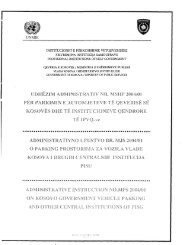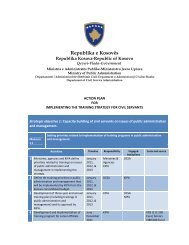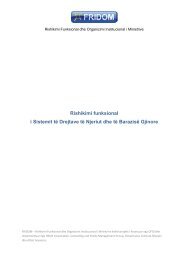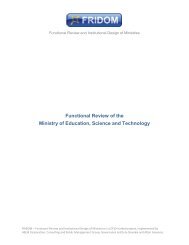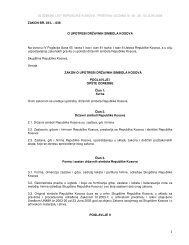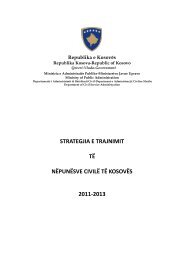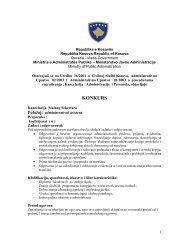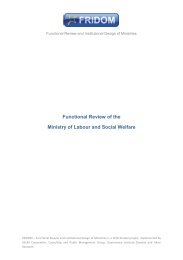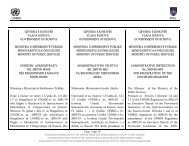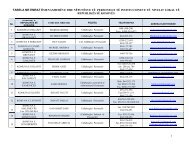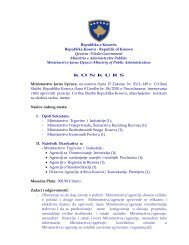Functional Review of the Ministry of Environment and Spatial Planning
Functional Review of the Ministry of Environment and Spatial Planning
Functional Review of the Ministry of Environment and Spatial Planning
Create successful ePaper yourself
Turn your PDF publications into a flip-book with our unique Google optimized e-Paper software.
The common duration <strong>of</strong> an employment contract at MESP is one year. Despite conventional practice <strong>of</strong><br />
employment contract prolongation, <strong>the</strong>re is no explicit job guarantee for public employees, which results in<br />
fluctuation. In some pr<strong>of</strong>essions this does not present a major problem, in <strong>the</strong> case <strong>of</strong> MESP however, <strong>the</strong><br />
dem<strong>and</strong> on <strong>the</strong> labor market for educated environmental <strong>of</strong>ficers with pr<strong>of</strong>essional experience (<strong>and</strong><br />
preferably also with language skills) is relatively high.<br />
We suggest <strong>the</strong> introduction <strong>of</strong> a compulsory state exam on pr<strong>of</strong>essional knowledge competence. Passing<br />
this exam should ensure <strong>the</strong> lifelong / open ended employment relationship in <strong>the</strong> central administration. If<br />
agreed, this would need a change in <strong>the</strong> current legislation.<br />
Recommendation II.10: Introduce into <strong>the</strong> civil service an obligatory state exam on pr<strong>of</strong>essional<br />
knowledge competence.<br />
Among o<strong>the</strong>r actions that can be achieved relatively soon <strong>and</strong> with little effort or costs are i) strategic HR<br />
documents <strong>and</strong> decisions <strong>and</strong> ii) better targeted <strong>and</strong> more dem<strong>and</strong> driven training. Both measures can be<br />
easily implemented by MESP, <strong>the</strong>y don’t require specific permission from o<strong>the</strong>r ministries or <strong>the</strong> Cabinet <strong>of</strong><br />
Ministers, <strong>and</strong> do not need to be embedded in legislation.<br />
Throughout <strong>the</strong> report <strong>the</strong> issue <strong>of</strong> staff capacity particularly on core competencies has been evident. In<br />
light <strong>of</strong> this <strong>the</strong> lack <strong>of</strong> capacity development <strong>and</strong> co-ordinated training programmes within <strong>the</strong> MESP is<br />
critical – currently no adequate plans <strong>and</strong> / or resources are available to identify <strong>and</strong> address training <strong>and</strong><br />
capacity building needs <strong>of</strong> <strong>the</strong> MESP staff.<br />
Based on <strong>the</strong> experience from o<strong>the</strong>r countries <strong>the</strong> highest dem<strong>and</strong> is expected in <strong>the</strong> field <strong>of</strong>: Managerial skills<br />
(administrative organization, delegation & supervision, leadership, time management); Training on<br />
environmental st<strong>and</strong>ards; <strong>Environment</strong>al monitoring; Training on EIA <strong>and</strong> IPPC; Solid waste management<br />
training; Industrial waste management training; Hazardous waste management training; Specialized GIS<br />
training; Technical English <strong>and</strong> Computer Driving License (CDL).<br />
There is also an absence <strong>of</strong> strategic human resource management in terms <strong>of</strong> clear definition <strong>of</strong> HR<br />
priorities <strong>and</strong> <strong>the</strong>n planning <strong>and</strong> executing definite steps to achieve <strong>the</strong>m. The HR Division devotes nearly<br />
all <strong>of</strong> its capacity to meeting formal requirements <strong>of</strong> <strong>the</strong> law in terms <strong>of</strong> recruitment <strong>and</strong> <strong>the</strong>re is very little<br />
focus on strategic human resource management. The ability <strong>of</strong> line managers to define competence<br />
pr<strong>of</strong>iles <strong>and</strong> requisite training needs is also relatively weak. On <strong>the</strong> positive side, <strong>the</strong> <strong>Ministry</strong> (toge<strong>the</strong>r<br />
with o<strong>the</strong>r Kosovo institutions) seems to benefit from <strong>the</strong> great effort made by Kosovars to build up <strong>the</strong><br />
national economy.<br />
Recommendation II.11: A systematic approach to staff capacity building is urgently required. Develop<br />
Human Resource Management (HRM) strategy <strong>and</strong> design capacity building programme as a part <strong>of</strong><br />
overall institutional development framework. The first practical step towards capacity building would be<br />
staff Training Needs Assessment (TNA).<br />
Rigid <strong>and</strong> ineffective salary system<br />
The salary system is one <strong>of</strong> <strong>the</strong> most critical management instruments at <strong>the</strong> MESP. The current salary<br />
<strong>and</strong> staff motivation system at <strong>the</strong> MESP is rigid, does not sufficiently reflect <strong>the</strong> content <strong>of</strong> work <strong>of</strong><br />
individual employees but ra<strong>the</strong>r is focused on formal categories <strong>and</strong> does not sufficiently include <strong>the</strong><br />
element <strong>of</strong> performance evaluation <strong>and</strong> substantiated performance bonuses. In fact <strong>the</strong> salary system<br />
creates adverse motivations whereby <strong>the</strong> only conceivable way <strong>of</strong> increasing an <strong>of</strong>ficial’s salary is by<br />
creating a higher level position. As a result <strong>the</strong> structural formations <strong>of</strong> <strong>the</strong> MESP are driven to create ever<br />
more complicated <strong>and</strong> fragmented internal structures – new divisions, sectors etc. The use <strong>of</strong> <strong>the</strong> salary<br />
system for staff motivation <strong>and</strong> performance management is very limited. Therefore we recommend<br />
decompressing <strong>the</strong> wage scale, so that <strong>the</strong> difference between a low grade <strong>and</strong> a high grade position<br />
becomes more evident in terms <strong>of</strong> individual income.<br />
18



